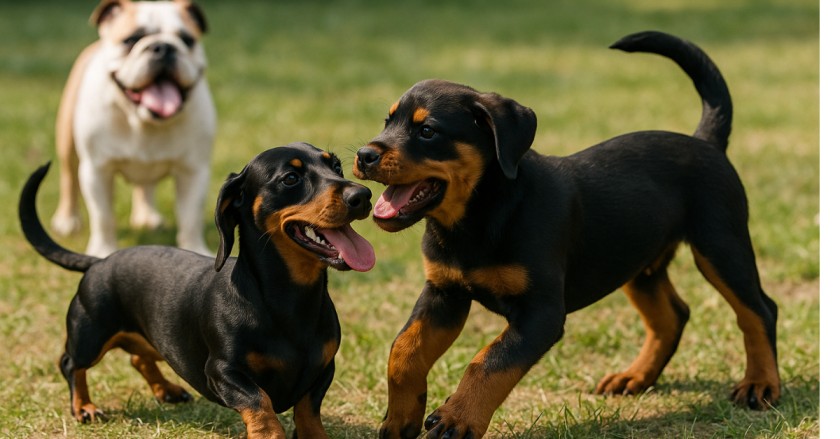It’s often heard that many dachshund owner find it difficult to leave their dachshund puppy alone at home. One of the major reasons for this is improper socialisation of your dachshund from an early stage. Dachshunds were originally bred for hunting, because of their ancestral background as hunter dogs, they can also show aggressive behaviour. If we don’t provide them proper socialisation from their early stage they it can be difficult to take them on outdoor walks, travelling, and vet visits. I am saying this based on my personal experience, which I have gone through.
That’s why today this blog focuses on the topic “how to socialise a dachshund puppy”, where I will provide you with simple, effective, and practical tips to socialise your dachshund puppy.
When people don’t socialise their dog in their first stage
Many people bring a dachshund puppy home but have no knowledge about their socialising needs; as a result, they often don’t focus on socialising them with different people and environments. However, the first few weeks (8 to 16 weeks) are their golden weeks. During this time, it’s important to expose them to different environments and people.
Benefits of early socialisation in the dachshund
Less inclined to separation anxiety
Dachshunds tend to form a strong attachment with their owner and caretaker and are inclined to separation anxiety; however, if we start exposing them to the outside environment and introducing them to other people and different animals from the age of 8 to 16 weeks of age, they become more familiar with the world around them. This socialisation helps to reduce the chance of having separation anxiety in the future.
Less aggressive behaviour
Dachshunds are slightly aggressive dogs, and this behaviour comes from their natural hunting instincts. We’ve all experienced how they tend to show aggressive behaviour by barking and howling. When the stranger and another animal try to approach them, one of the main reasons behind this is a lack of socialisation.
Help with resource guarding
Dachshunds see only their owner as a trusted guardian and show guarding manners by barking and howling when other animals and a stranger get close to them. However, if your dog is socialised well with which reduces the chances of showing this type of behaviour, by being familiar with different types of animals and people.
How to socialise a dachshund puppy
Start early
Once you bring your dachshund puppy home, it’s best to start socialisation as soon as possible after initial vaccination. The period between 8 to 16 weeks of age is a golden time to start socialising your dachshund puppy. As soon as your vet allows them to socialise, you should begin the socialisation process without any delay.
Introduce slowly
Invite friends and neighbours to meet your puppy, including people from different age groups, different backgrounds, different genders, and different appearances. During these interactions, praise and reward your dog with their favourite treat. This helps your dog to associate meeting new people with receiving positive attention and rewards, and makes further socialising sessions easier.
Meet other dogs (supervised)
Arrange a supervised meeting and playing session with other dogs and animals. When introducing other dogs, make sure that all the dogs and other animals are properly vaccinated. Allowing your dog to play with other unvaccinated dogs can increase the risk of transmitting harmful diseases like rabies.
Always remember never to leave your dog unsupervised with other dogs; leaving your dog alone with other dogs can lead to various risks, such as back injuries and biting by other bigger dogs.
Exposure to different environments
Expose your dachshund to different situations like dog parks, sidewalks, and pet stores. Let your dachshund interact with different surroundings and allow them to walk on various surfaces, like grass, to help them adjust and feel confident.
Handle gently
Regularly touch their ears, mouth, and gently stroke their coat. Doing this helps your dog to become more comfortable during future vet visits. Gently encourage your friends and family members to stroke your puppy’s coat and their head, which will make them comfortable in future interactions with strangers.
Positive reinforcement
Praising and treating them after every new interaction helps them to associate treating and praising with new interactions. Keeping a social session short to prevent feeling overwhelmed and scared, which further encourages them to stay social and confident in future sessions.
Stay consistent
Many dachshund owners tend to say that they can’t train their dachshund because they are stubborn. Their stubborn nature is part of their hunter ancestors. During hunting time, they often had to ignore the owner’s command and rely on their own hunting ability. This behaviour is natural because if they weren’t confident in their own skill and depended entirely on the owner’s instruction, hunting might not be effective as they used their own hunting skill.
In dachshund training, most owners fail because they are inconsistent in their dog training. Dachshunds have a stubborn nature that is deeply hardwired in their brains, but with consistency and lots of patience, we can reprogram their minds to some extent. That’s why it’s essential to us to be consistent in training.
I’ve heard that many dachshund owners say that potty training a dachshund feels almost impossible. It is not impossible; we just need to be consistent. The same applies to their socialisation as well.
Conclusion
When we bring an achshund puppy at we might not know what to do in their childhood stage. But if you need to raise a confident and well-behaved dachshund, one of the best things we can do is socialise them from their early stage (8 to 16 weeks of age). Socialising them from their golden learning time helps your dog to become confident in further social situations, reduces of chance of having separation anxiety, helps with resource guarding behaviour, and even indirectly helps with aggression issues.

